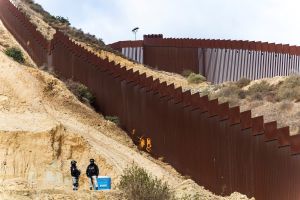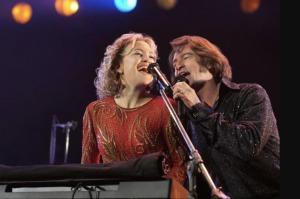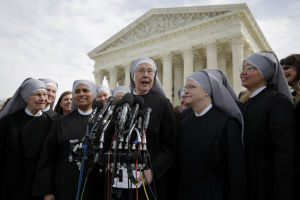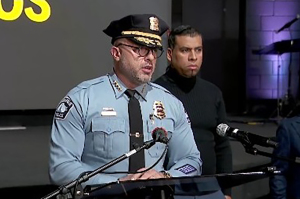Why Do Secular Liberals Fear 'The Response?'
A key leader for The Response, a massive and growing gathering of Christians in nine key political venues this year, admits that the movement intends to spur Christians to political action this election year but denies the movement has a specific and secret political agenda as a growing number of secular liberal critics charge.
While hailed as an admirable cause by some, the tour – next stop South Carolina next week – has already ignited charges that it is a meeting ground for what secular liberal critics fear is the secret agenda of the New Apostolic Reformation (NAR), which they claim is a strategy of religious-political coercion by evangelical leaders to reshape public policy toward biblical ends.
The Response Director Luis Cataldo acknowledged to The Christian Post that its schedule is intentionally aligned to that of the primaries. And The Response, he said, is definitely about influence.
“We are trying to influence the primary race in that the [current] moral climate, the legislation doesn’t reflect the values of the evangelical church,” Cataldo revealed.
But prayer for repentance and for future engagement is The Response’s key goal, he said, not the picking of a specific candidate to further a specific cause. Although some may see the activity as a soft endorsement of a GOP candidate or the Republican Party, Cataldo argued the event does not seek to hold that kind of sway.
Cataldo said all political candidates are invited to participate in the events. However, the event does not seek to pick out or endorse candidates, he said. Candidates who attend are allowed to pray “from the Bible,” he said, but not give political speeches.
“That was one of the things we most said at the beginning that we’re not political people, we’re praying people,” said Cataldo.
But he added, “Prayer must be followed by action.”
Cataldo hopes that Response attendees will leave the event motivated to engage their faith and perform services in their community and through global outreach. He said he also hopes they will be influenced to vote in the 2012 elections and make a difference nationally.
It is also his desire to see news of The Response splashed across newspaper headlines just as local primaries draw closer so that all can know that evangelicals are shaking up the secular culture.
“The Church is asleep as people of prayer and people of justice; it’s time to wake up,” he explained.
As Christians called to bear witness to biblical truth, Cataldo said, “We have to do something and we’re saying that something is to pray and engage the culture.”
Texas Observer columnist and NAR investigator Forrest Wilder argues that the movement is much more sinister. He describes NAR as an "interlocking array of churches, ministries, councils, personal friendships and alliances" that are connected to promote Christian dominion over society, culture and government.
But one informed evangelical familiar with the movement said The Response is seeking to influence minds with the Bible message leading into the 2012 presidential election, but not in the way NAR critics believe.
Cataldo told the Christian Post that The Response is not a part of NAR. NAR, he clarified, is simply a label to identify a new trend in evangelical ministry, not an insider action group with a political agenda.
C. Peter Wagner, the Fuller Theological Seminary professor who coined the phrase in the early 1990s to describe modern day revival movements in the Christian church from the 1900s on, asserted in an Aug. 19 open letter rebuking critics: “The usual meaning of theocracy is that a nation is run by authorized representatives of the church or its functional religious equivalent. Everyone I know in NAR would absolutely reject this idea, thinking back to Constantine's failed experiment or some of the oppressive Islamic governments today.”
Nonetheless, critic Rachel Tabachnick says she regularly monitors The Response and youth prayer movement TheCall on the blog Talk to Action. Despite Wagner’s rebuke, she argues rallies like The Response and TheCall use what she calls “religio-politico” strategies to recruit voters, minority voters in the case of the TheCall in Detroit, in preparation for the 2012 election.
She complains that TheCall organizer Lou Engle has “laid hands on and prayed for” current and past politicians Newt Gingrich and Mike Huckabee in other events. She also finds fault with Perry leading prayer at The Response Texas.
The Response was first launched in August 2011 in Houston, Texas. The event drew over 40,000 attendees and was simulcast to 100,000 more. Now the event is making its way through the South and the Midwest, making stops in Arizona, Tennessee, Missouri and Ohio.
The next stop is Greenville, S.C., on Jan. 17 – just days away from the Jan. 21 primary. The South Carolina rally will be followed by a Jan. 24 Response in Orlando, Fla. The Florida primary is scheduled for Jan. 31.
Texas, the site of the first prayer event, has the second largest delegate count (a projected 149) going into the 2012 primaries. Georgia, The Response’s sixth stop on its 2012 tour, also has a large delegate count (72). While California will likely have the largest amount of delegates with an estimated 172, The Golden State is not featured on The Response’s schedule.
The Response’s second event was held in Cedar Rapids, Iowa, on a Dec. 6, 28 days before Iowa’s Jan. 3 caucus.
Rivers of Life Ministries, the location for the Iowa Response, was founded by Francis Frangipane. Frangipane, Tabachnick wrote on Talk to Action, was on stage during TheCall Detroit. TheCall organizer Lou Engle and Cataldo are also both affiliated with megachurch The International House of Prayer.
The Response is also planning an Arizona rally for its primary month February. No exact date has been set for it or the remaining six stops.



























